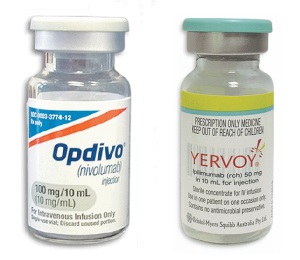The government expanded health insurance benefits for immunotherapy Opdivo (nivolumab) and Yervoy (ipilimumab) to treat renal cancer, head and neck cancer, and Hodgkin lymphoma.
Opdivo, a programmed death receptor-1 (PD-1) blocking antibody, and Yervoy, a CTLA-4 inhibitor, were developed by BMS and Ono Pharmaceutical.

The government also changed the detail of the reimbursement criteria for Novartis’ CDK4/6 inhibitor Kisqali (ribociclib).
On Friday, the Health Insurance Review and Assessment Service (HIRA) announced that it revised the notification of cancer drugs, and the revision would take effect on Sept. 1.
HIRA newly recognized the insurance benefit of Opdivo plus Yervoy combination therapy for the first-line treatment of patients with advanced kidney cancer who are in the moderate or high-risk group for IMDC (International Metastatic RCC Database Consortium) scores with clear cell carcinoma.
Yervoy won approval as combo therapy with Opdivo to treat moderate-to-high-risk advanced renal cell carcinoma without prior treatment experience.
The U.S. National Comprehensive Cancer Network (NCCN) and the European Society for Medical Oncology (ESMO) recently recommended the Yervoy and Opdivo combo as the highest priority for the first-line treatment of moderate-to-high risk clear cell carcinoma, and HIRA decided to grant the reimbursement.
In a phase 3 study, Opdivo plus Yervoy demonstrated clinical usefulness by improving medial overall survival (MOS), median progression-free survival (mPFS), and objective response rate (ORR) in moderate or high risk advanced clear cell carcinoma patients, compared to sunitinib monotherapy.
Opdivo monotherapy is also reimbursable for treating recurrent or metastatic head and neck squamous cell cancer that is PD-L1 expression positive and has progressed within six months during or after the platinum-based chemotherapy.
Opdivo was authorized to treat relapsed or metastatic head and neck squamous cell carcinoma that has progressed during or after previous platinum-based chemotherapy.
After the NCCN guidelines recommended Opdivo monotherapy as “category 1” for the second-line or follow-up treatment, HIRA granted new reimbursement for Opdivo.
In a phase 3 trial in patients with head and neck squamous cell carcinoma that progressed during platinum-based chemotherapy or relapsed within six months of the last dose, Opdivo monotherapy showed benefits in mOS and ORR, compared to alternative therapies (methotrexate, docetaxel, and cetuximab monotherapy).
However, as patients with less than 1 percent, PD-L1 expression rate showed an mOS similar to alternative therapy, HIRA limited the reimbursement for only those with a 1 percent or higher PD-L1 expression rate.
HIRA also allowed reimbursement for Opdivo monotherapy for third-line or higher stage treatment for patients with Hodgkin lymphoma who relapsed or progressed despite autologous hematopoietic stem cell transplantation and administration of brentuximab.
Considering the characteristics of Hodgkin lymphoma and foreign regulators’ approval for the treatment of pediatric patients, HIRA granted reimbursement for Opdivo in pediatric patients, too.
The latest revision also added a detailed condition for reimbursement for Kisqali, a treatment for breast cancer. The therapy is reimbursable for premenopausal women who relapsed during or within one year after endocrine therapy or chemotherapy, except for nonsteroidal aromatase inhibitors, as adjuvant therapy after surgery or prior chemotherapy.
Kisqali gets health insurance benefits as a combo therapy with letrozole and anastrozole for the first-line treatment of premenopausal HR+/HER2- metastatic and relapsed breast cancer patients who have not been treated with nonsteroidal aromatase inhibitors.
The NCCN and ESMO strongly recommend Kisqali plus aromatase inhibitor combo to treat patients with HR+/HER2- relapsed or metastatic breast cancer.
A sub-group analysis of a phase 3 study, MONALEESA-7, showed that Kisqali plus aromatase inhibitor combo demonstrated statistically significant outcomes in the patient group who relapsed within 12 months after prior chemotherapy or adjuvant therapy after surgery, compared to the control group.
The latest reimbursement for the combo therapy was based on these trial results.

